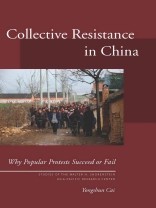Although academics have paid much attention to contentious politics in China and elsewhere, research on the outcomes of social protests, both direct and indirect, in non-democracies is still limited. In this new work, Yongshun Cai combines original fieldwork with secondary sources to examine how social protest has become a viable method of resistance in China and, more importantly, why some collective actions succeed while others fail.
Cai looks at the collective resistance of a range of social groups—peasants to workers to homeowners—and explores the outcomes of social protests in China by adopting an analytical framework that operationalizes the forcefulness of protestor action and the cost-benefit calculations of the government. He shows that a protesting group’s ability to create and exploit the divide within the state, mobilize participants, or gain extra support directly affects the outcome of its collective action. Moreover, by exploring the government’s response to social protests, the book addresses the resilience of the Chinese political system and its implications for social and political developments in China.
Über den Autor
Yongshun Cai is Associate Professor of Political Science at Hong Kong University of Science and Technology. He is the author of
State and Laid-Off Workers in Reform China: The Silence and Collective Action of the Retrenched (2006).












